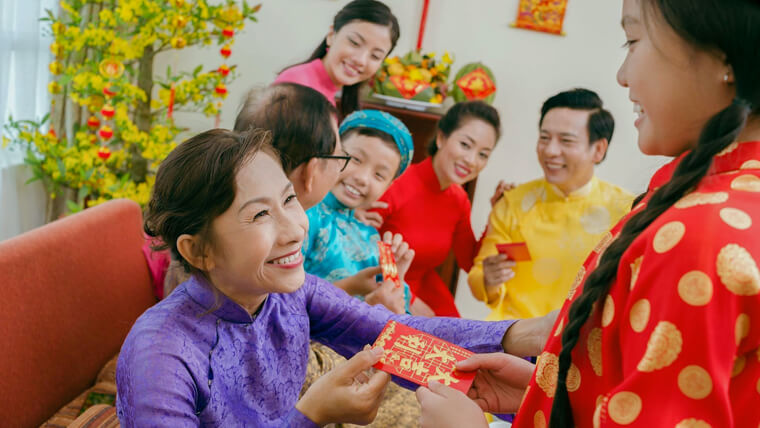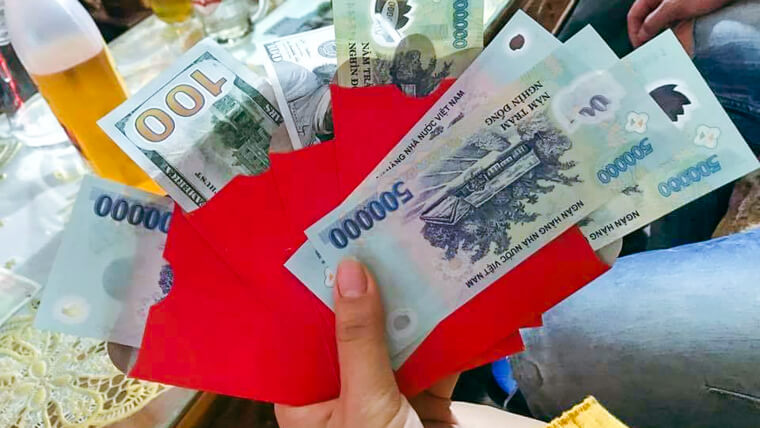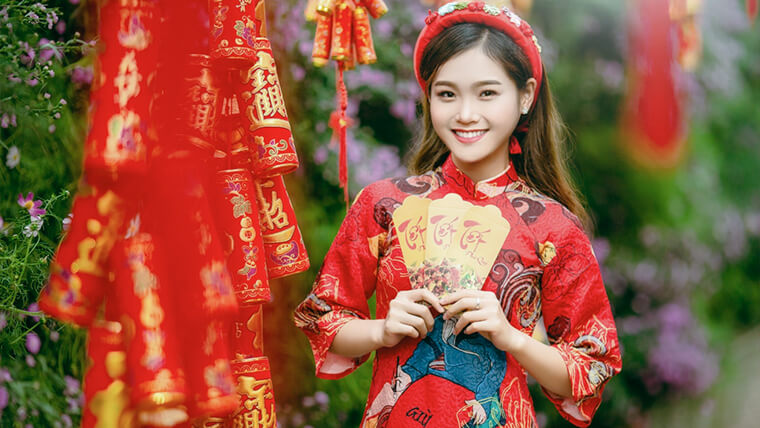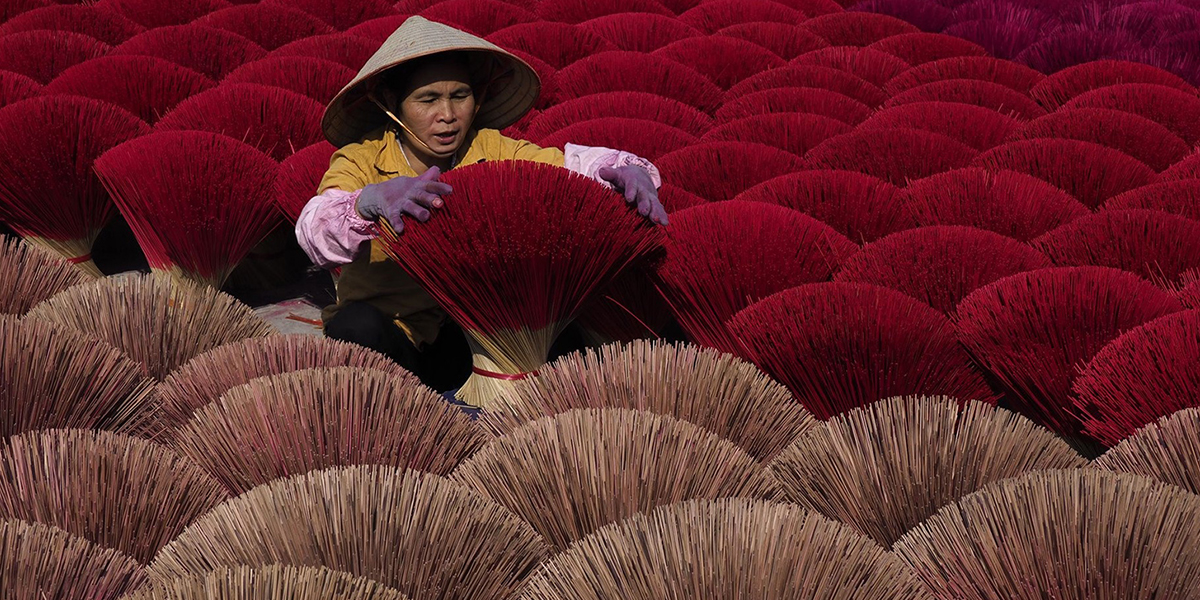The Lunar New Year is an extremely important occasion for the people of Asian countries in general, and of Vietnam in particular. During Tet holiday, one of the beautiful and indispensable customs of the locals is giving “li xi”, containing messages and wishes from the sender to the receiver.
1 - What exactly is Vietnamese li xi?
Li xi envelopes are actually a fairly new way of calling “Vietnamese lucky money”, which only appeared about 30 years ago, referring to money given to children (and sometimes the younger ones) on the first day of Tet holiday. However, Vietnamese li xi is not limited to one day, but lasts for the first three days of the year, even until the last days of Lunar New Year holiday. The Vietnamese dictionary classifies “li xi” as a verb / dialect, perhaps because this word was originally only found in the Cho Lon area in Ho Chi Minh City, where many Chinese lived. According to Professor Nghiem Toan, the word Vietnamese li xi is the Cantonese sound of the Chinese word “lishi” meaning “good fortune” / “luck”.

Source: tatinta.com
No Vietnamese knows exactly when the custom of giving lucky money in Tet holiday started, but some people think there has always been Vietnamese gift-giving etiquette, that adults want to give money to children, so it gradually became a habit. At the same time, a lot of people, including many historians, strongly believe that this custom was imported from China.
To explain the origin of Vietnamese li xi, there was a fairy tale with thrilling nuances. According to that, there was a demon who often appeared on New Year's Eve, who liked to cause trouble and made children sick, so no parents dare to sleep. Among them was a barren couple who had just given birth to a child at old ages, so they couldn’t stay up all night to take care of the child. Their worry touched the 8 fairies passing by the house, who then decided to help by turning into 8 coins and staying with the baby. The couple wrapped them in red paper and placed the envelope on the child’s pillow, which later scared the demon away. The story of the successful banishment quickly spread, and others imitated it by putting money in red paper packets to protect the children.
Meanwhile, according to some historical and folklore studies, the custom of giving Vietnamese li xi dates back to China’s Tang Dynasty, with two stories both related to the king. Legend has it that at this time, Yang GuiFei (Imperial Consort Yang) gave birth to a son and was given some gold and silver wrapped in red paper by King Tang XuanZong. She considered it both a lucky money and a talisman given to children by the king to ward off evil spirits - the belief then quickly became a trend in the country. As for the second story, the king often gave back a little bit of the tribute the guests offered, called “lucky money”, which created a movement among the mandarins, aristocrats and the people. To reduce the cumbersome, they immediately improved by replacing gifts with money put in “red envelopes”.
2 - Customs and meaning of Vietnamese li xi

Source: clbnhadautu.com
On the first days of the year when Vietnamese people go to greet their relatives, the adults will give children red envelopes with a small amount of money inside symbolizing wishes for luck and fortune. Now, Vietnamese lucky money is also given to grandparents and parents by their sons, daughters, and grandkids, and in other different occasions such as celebrating a new home, celebrating an increase in wage,…
The Vietnamese New Year red envelopes at first had a spiritual meaning, called “happy new age” and expressed the blessings of the givers, all meaning good things. On the first day of Lunar New Year, children and grandchildren in the house in turn say wishes and give gifts to their grandparents and parents. After that, they are given a red envelope back, inside which contains a little money called “tien li xi” and brings joy on the first day of the new year. This happens not only within family members, but when guests come to wish them Happy New Year, they also give and are given Vietnamese li xi.
Red envelopes also carry many good thoughts, symbolizing privacy - people will have less competition, which leads to less friction and unhappiness during Tet. Envelopes symbolize fortune and for Asians, red is one of the luckiest and liveliest colors in festivals. Moreover, the li xi envelopes also symbolize fortune - the more red packets people receive or give away, the more fortune they believe they have made. Today, red envelopes are also used by Vietnamese businesses to reward customers, send to partners or give to employees.
For Tet, Vietnamese New Year red envelopes are an indispensable thing, a custom that people have kept for generations, causing the sale of li xi envelopes on the days leading up to Tet rockets. The streets are all filled with traditional red envelopes covered with gold lines, as well as unique patterned envelopes.
When it comes to places that sell beautiful red envelopes for Vietnamese li xi, many people still go to traditional markets, especially those of the older generations. With a long history, shops at Dong Xuan Market or Hang Ma Street in Hanoi Old Quarter, and Ben Thanh Market in Saigon are all crowded with people buying Vietnamese New Year envelopes when Tet comes. In addition, with increasingly expanded and improved services, you can also easily place orders on e-commerce platforms such as Lazada, Shopee, Tiki, …
Not only are there a variety of ways to buy, but today’s red envelopes also have good materials and many beautiful designs. You can use your own custom envelope printing, the way many companies and businesses do recently to show off their brands. The era of technology and recently the Covid epidemic also brought about a new type of Vietnamese lucky money, which is online lucky money. People use digital wallets to deposit small amounts of li xi Tet, with lucky numbers like 9999 or 8888.
3 - Compare Vietnamese li xi with some other countries

Source: tatinta.com
China
Quite similar to the tradition of Vietnam, the Chinese also often give lucky money to young people who are still studying or are unemployed. The money in the envelope usually ends with an even number, but should not include the number 4 because its pronunciation is similar to the word “die”. The children who received the lucky money did not open it immediately but had to put it under the pillow and then open it after about a week. In recent years, virtual red envelopes have emerged in China, especially among the young.
Korea
Sabae is the name of the li xi envelopes in Korea, carrying not only money but also gold, gems,… On New Year's Day, the children in the family wear traditional costumes and perform a ritual bowing to the elderly to show their gratitude, receiving lucky money afterwards with wishes of health and peace in the new year.
Vietnamese li xi and Taiwan li xi
A special feature of Taiwanese in the giving of lucky money custom is that the amount must always be even because they believe that an even number means auspiciousness and luck. In addition, according to Taiwanese people, the money in the li xi red envelope must be new because it’s the “new” year, and old money will bring back the bad memories in the past.
Singapore
Singaporeans take it very seriously during the traditional New Year, often focusing on giving lucky money to parents, grandparents or relatives. In addition to cash, they also give lucky money by check, voucher,...
Vietnamese li xi and Malaysia li xi
The Muslim Malaysians have soon accepted the custom of celebrating the age of the elderly and children by handling out money during the Muslim New Year Eid al - Fitr. However, instead of red envelopes, they used green ones, which are prepared beforehand to give to any guests who come to congratulate on Eid al - Fitr New Year.
Japan
Japanese lucky money is called Otoshidama, and the li xi envelopes are white rather than red as is common in other countries. Moreover, the name of the recipient will be written on the envelope to show respect and the amount of money depends on the age of the child, as well as the relationship to the family.
Although each country has a different way of giving lucky money and there are many changes over time, the basic custom forever means to send good wishes in the new year. Vietnamese li xi is a cultural beauty that needs to be protected and preserved, avoiding letting it transform into too material purposes.







 — Giang Phạm
— Giang Phạm




































